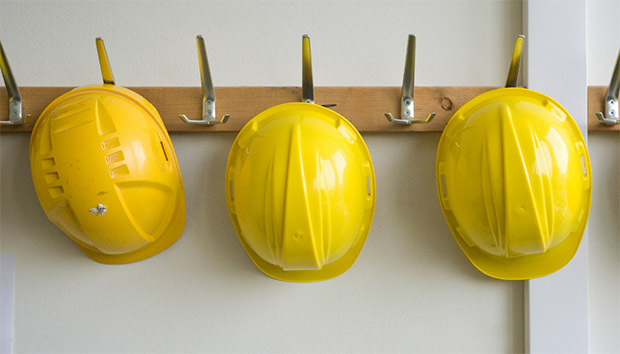Prevail in knowing when to apply prevailing wage
By: WISCONSIN LAW JOURNAL STAFF//March 20, 2017//

By Carrie Cox
To properly apply prevailing wage rates and hours, it is important to understand the nuances of state highway work in determining what is and is not covered for certain workers — especially when it comes to working with aggregates and processed materials.
Knowing when to apply prevailing wages

The prevailing-wage law regarding rates for both state agency and state highway projects still includes language concerning workers engaged in what is essentially preparing and hauling gravel, cement, fill, and other road materials. In addition, the Wisconsin Department of Transportation has further specified what is and is not a mineral aggregate for its projects.
Location, location, location
Workers covered by these sections — laborers, workers, mechanics, and truck drivers — may or may not be subject to prevailing-wage rates depending on the location and type of the work performed. If workers are on the site of a project, they must receive the prevailing wage rates and hours.
If workers are at or doing work associated with a “commercial establishment fixed in location” and supplying processed or manufactured material or product “which is not dedicated exclusively or nearly exclusively with the project,” they are not subject to prevailing-wage rates or hours. However, workers who go to sources of mineral aggregate and deliver that to the project site, and workers who pick up excavated materials from a project site and transport it away, are subject to prevailing wages and hours.
Defining ‘mineral aggregate’
Understanding what constitutes mineral aggregate is important when you are trying to apply prevailing wage rates and hours. The “on-site” and “dedicated exclusively or nearly exclusively” to previsions are fairly easy to manage. Workers at a facility for processing or manufacturing that is not on-site and/or dedicated to a project will not be subject to the prevailing wage rates or hours. However, workers at an off-site material batch plant created solely for a specific highway project are covered under prevailing wages.
So what is a mineral aggregate?
The statute defines mineral aggregate as materials such as sand, gravel, or stone. It might seem simple, but for state highway projects this includes what may look like processed materials because the materials are acted upon before hauling.
WisDOT defines materials like gravel, sand, and stone that are sorted, screened and crushed as mineral aggregates as well. However, WisDOT also includes combining recycled concrete with virgin materials and performing the aforementioned actions.
So gravel or stone sorted and screened remains mineral aggregate and workers associated with this work remain subject to prevailing wages.
Starting point: WisDOT’s chart
WisDOT’s website provides a chart that helps identify when a truck hauling material to a worksite is covered under prevailing wage and hour requirements. The website also provides information on what is not a mineral aggregate, and what is considered a dedicated facility under Wis. Stat. §84.062(2m)(b).
As noted, with respect to work for WisDOT, mineral aggregate is not just the raw material pulled from a pit or quarry. Likewise, graded mineral aggregate material may at first blush appear to be “processed,” but it is not. Conversely, truckers hauling materials from source locations that are not “mineral aggregates,” such as topsoil, dirt, and the like, are not subject to prevailing wage rates and hours.
Understanding those nuances will help you not only comply with the law, but also prepare bids that properly account for these circumstances.
Legal News
- Former law enforcement praise state’s response brief in Steven Avery case
- Eric Toney announces re-election bid for Fond du Lac County District Attorney
- Former Wisconsin Democratic Rep. Peter Barca announces new bid for Congress
- Republicans file lawsuit challenging Evers’s partial vetoes to literacy bill
- More human remains believed those of missing woman wash up on Milwaukee Co. beach
- Vice President Harris returning to Wisconsin for third visit this year
- Wisconsin joins Feds, dozens of states to hold airlines accountable for bad behavior
- Trump ahead of Biden in new Marquette poll
- Bankruptcy court approves Milwaukee Marriott Downtown ‘business as usual’ motion
- New Crime Gun Intelligence Center to launch in Chicago
- Arrest warrant proposed for Minocqua Brewing owner who filed Lawsuit against Town of Minocqua
- Wisconsin Supreme Court justices question how much power Legislature should have
WLJ People
- Power 30 Personal Injury Attorneys – Russell Nicolet
- Power 30 Personal Injury Attorneys – Benjamin Nicolet
- Power 30 Personal Injury Attorneys – Dustin T. Woehl
- Power 30 Personal Injury Attorneys – Katherine Metzger
- Power 30 Personal Injury Attorneys – Joseph Ryan
- Power 30 Personal Injury Attorneys – James M. Ryan
- Power 30 Personal Injury Attorneys – Dana Wachs
- Power 30 Personal Injury Attorneys – Mark L. Thomsen
- Power 30 Personal Injury Attorneys – Matthew Lein
- Power 30 Personal Injury Attorneys – Jeffrey A. Pitman
- Power 30 Personal Injury Attorneys – William Pemberton
- Power 30 Personal Injury Attorneys – Howard S. Sicula










